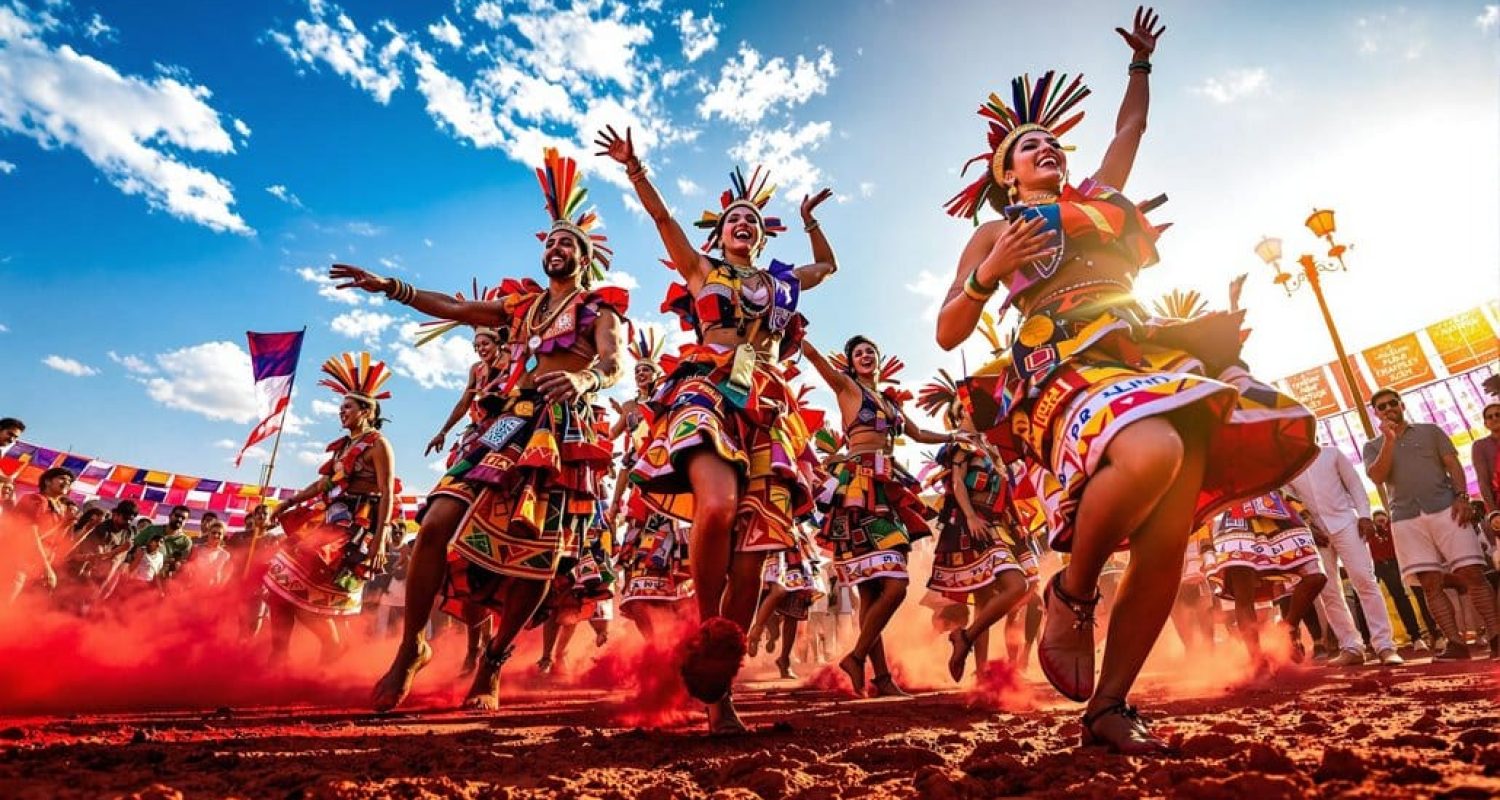Unique African celebrations are vibrant expressions of cultural identity and community values. Events like Ethiopia's Timket and Nigeria's Osun-Osogbo highlight spiritual beliefs and heritage through colorful rituals and music. You're invited to witness the Wodaabe people's Gerewol in Chad, where love and beauty unite. These festivals not only preserve traditions but also boost local economies by attracting visitors and promoting cultural exchange. By engaging younger generations, they strengthen social bonds within communities. If you explore further, you'll uncover fascinating details about more celebrations and the richness they bring to Africa's diverse cultural landscape.
Key Takeaways
- Unique African celebrations, like Timket and Osun-Osogbo, embody local beliefs and preserve cultural heritage through rituals and traditions.
- Festivals such as Gerewol in Chad and Ouidah Voodoo in Benin showcase community identity and promote understanding of indigenous spiritual practices.
- Events like the Cape Town International Jazz Festival and Lake of Stars Festival stimulate economic growth by attracting tourism and supporting local artisans and vendors.
- Vibrant music and dance at festivals facilitate cultural exchange, fostering community bonds and enriching appreciation of Africa's diverse artistic heritage.
- Spiritual celebrations like the Zangbeto Festival and Abu Simbel Festival reinforce connections to ancestors and nature, highlighting the significance of spirituality in African cultures.
Cultural Importance of Festivals
Festivals in Africa are more than just celebrations; they're living expressions of local beliefs and traditions that shape community identity. These cultural festivals, like the Timket in Ethiopia and the Osun-Osogbo in Nigeria, highlight the significance of rituals and performances in preserving heritage. They not only reinforce social bonds among community members but also foster a sense of belonging that resonates deeply within indigenous cultures.
As you engage with vibrant African music and enchanting dances, you'll notice how these events create spaces for cultural exchange, inviting diverse groups to share in the experience. By participating in these rich celebrations, you help sustain local economies, providing essential support to artisans and vendors.
Moreover, festivals play a critical role in engaging younger generations, instilling a sense of pride and awareness of their cultural heritage. Through storytelling, music, and art, they address contemporary social issues while nurturing a collective identity.
In this way, African festivals become more than mere gatherings; they serve as indispensable threads woven into the fabric of community life, ensuring traditions are passed down and cherished for years to come.
Notable African Celebrations
When you explore notable African celebrations, you'll discover a rich tapestry of cultural heritage and spiritual practices that reflect the continent's diversity.
Festivals like the Gerewol in Chad and Timket in Ethiopia not only showcase unique traditions but also strengthen community bonds and identities.
These events invite you to appreciate the deep-rooted histories and vibrant expressions of African cultures.
Cultural Heritage Festivals
Celebrating cultural heritage through vibrant festivals showcases Africa's rich tapestry of traditions and identities. Each festival offers a unique lens into the continent's diverse cultures, fostering a sense of belonging and unity among people.
Here are some notable examples:
- Gerewol Festival: Wodaabe men flaunt their beauty adorned in elaborate face paint, engaging in mesmerizing traditional dances.
- Timket: Ethiopia's Orthodox Christian celebration features colorful processions and mass baptisms that draw thousands of pilgrims, highlighting deep-rooted spiritual heritage.
- Ouidah Voodoo Festival: This lively event honors traditional Voodoo practices through rituals, music, and dance, promoting a greater understanding of cultural significance.
- Lake of Stars Festival: Set against the stunning backdrop of Lake Malawi, this celebration brings together local talent and international artists, fostering cultural exchange through music and arts.
- Cape Town International Jazz Festival: As the largest jazz festival in Africa, it showcases over 40 artists, celebrating cultural diversity and the power of musical expression.
These festivals not only preserve traditions but also create spaces for connection and reflection, reminding us of the shared human experience through cultural heritage.
Spiritual Celebrations and Practices
Across the African continent, spiritual celebrations and practices serve as profound expressions of cultural identity and community connection.
You'll find that the Zangbeto Festival in Togo brings people together through spiritual rituals and elaborate performances, linking dancers to their ancestors. This festival beautifully showcases local supernatural beliefs and strengthens community bonds.
Similarly, the Osun-Osogbo Festival in Nigeria honors the goddess Osun, attracting individuals from around the world. Through music and traditional dances, it promotes a deeper understanding of Nigeria's rich spiritual heritage.
The Ouidah Voodoo Festival in Benin emphasizes the significance of Voodoo, celebrating traditional religion with vibrant ceremonies and dances that reflect the nation's cultural identity.
In Ethiopia, the Timkat Festival commemorates Jesus' baptism with colorful processions and joyous music, serving as a crucial religious observance for the Ethiopian Orthodox community.
Meanwhile, the Abu Simbel Festival in Egypt aligns rituals with the sun's entry into the ancient temples, illuminating Ramses II's statues and reinforcing the connection to spirituality and heritage.
These celebrations enrich communal ties and highlight the diverse spiritual landscapes across Africa.
Spiritual Connections and Beliefs
In exploring African celebrations, you'll find that rituals and spiritual practices play a crucial role in connecting communities to their ancestral ties.
Events like the Osun-Osogbo Festival not only honor deities but also foster a sense of belonging among participants.
Through these shared experiences, people reinforce their cultural identities and deepen their spiritual connections.
Rituals and Spiritual Practices
Many vibrant African festivals showcase deep-rooted rituals and spiritual practices that connect communities with their cultural heritage and ancestral spirits.
These celebrations often serve as a means to reaffirm identity and strengthen social bonds, allowing you to participate in a collective experience that transcends time.
- The Zangbeto Festival in Togo emphasizes engaging in rituals to honor ancestors, ensuring community safety and well-being.
- The Gerewol Festival in Chad features beauty contests and traditional dances that reinforce spiritual beliefs among the Wodaabe people.
- Timket, Ethiopia's celebration of Epiphany, involves mass baptisms symbolizing spiritual rebirth and unity within the Orthodox Christian faith.
- The Osun-Osogbo Festival in Nigeria includes elaborate rituals and music that honor the goddess Osun, reflecting the Yoruba people's spiritual heritage.
- The Ouidah Voodoo Festival in Benin highlights traditional beliefs through ceremonies and sacrifices, connecting participants with spiritual forces.
These rituals not only celebrate cultural identity but also foster a sense of belonging and understanding within the community.
As you witness and partake in these ceremonies, you embrace a rich tapestry of beliefs that shape the essence of African life.
Community and Ancestral Ties
Celebrating community and ancestral ties reveals how deeply spiritual connections shape African identities. Festivals like the Zangbeto Festival in Togo showcase this beautifully, as dancers embody ancestral spirits, reinforcing community ties through mesmerizing traditional dances and cleansing rituals.
The Gerewol Festival in Niger mirrors this sentiment, where the Wodaabe people's beauty and courtship rituals celebrate their collective identity rooted in ancestral heritage.
Timket, the Ethiopian Orthodox celebration of Epiphany, fosters an intimate bond as participants reenact Jesus' baptism, weaving their spiritual beliefs with cultural identity.
In Nigeria, the Osun-Osogbo Festival honors the goddess Osun, drawing people globally to partake in rituals that affirm their spiritual beliefs and community connections.
Similarly, the Ouidah Voodoo Festival in Benin emphasizes the importance of ancestral ties, where traditional rituals connect participants to their heritage and reinforce the significance of Voodoo in shaping communal bonds.
These festivals not only celebrate individual cultures but also unite people in shared experiences, highlighting how ancestral spirits guide and nurture community ties.
Economic Impact on Communities
Unique African celebrations serve as vibrant catalysts for economic growth within their communities. Festivals like the Cape Town International Jazz Festival and the Hermanus Whale Festival not only showcase cultural heritage but also greatly boost the local economy.
When you participate in these events, you're contributing to a system that supports local artisans, hospitality, and tourism.
- The Cape Town International Jazz Festival attracts around 30,000 visitors, injecting millions into the local economy.
- The Lake of Stars Festival in Malawi draws attendees from over 30 countries, promoting cultural tourism and enhancing local businesses.
- The Hermanus Whale Festival welcomes approximately 100,000 visitors annually, benefiting food vendors, artisans, and entertainers.
- Events like the Timkat Festival in Ethiopia celebrate religious traditions while enhancing local commerce and awareness of cultural heritage.
- The Gerewol Festival in Niger not only highlights Tuareg culture but also stimulates local economies through international engagement.
Travel Experiences During Festivals
Amidst the vibrant colors and sounds of African festivals, travelers find themselves immersed in rich cultural experiences that offer a glimpse into local traditions and customs.
Take the Gerewol Festival in Chad, where you can witness fascinating beauty rituals that celebrate love and community. Similarly, the Timket Festival in Ethiopia invites you to engage in profound religious ceremonies, allowing you to connect deeply with the spiritual essence of the culture.
At the Lake of Stars Festival in Malawi, you'll enjoy a mélange of music and arts along the picturesque shores, fostering cultural exchange among over 30,000 visitors.
The Sauti za Busara Festival in Zanzibar showcases the continent's diverse musical heritage, with performances from more than 400 musicians, giving you an opportunity to appreciate Swahili culture in its vibrant forms.
Don't miss the Cape Town International Jazz Festival, Africa's largest, where you can celebrate the continent's rich performing arts scene.
Finally, the Fes Festival of World Sacred Music in Morocco offers workshops that deepen your understanding of sacred traditions.
Each festival provides immersive experiences that enrich your connection to Africa's cultural tapestry.
Preservation of Heritage and Traditions
African festivals serve not only as vibrant showcases of music and art but also as essential conduits for preserving heritage and traditions. They act as a living bridge between generations, where cultural values are transmitted through rituals, celebrations, and community participation.
You'll find that each festival carries deep significance, reflecting the unique identity of its people.
- The Gerewol Festival in Chad, where love and beauty are celebrated through dance.
- The Osun-Osogbo Festival in Nigeria, a vibrant homage to the river goddess.
- The Bianou Festival in Niger, emphasizing unity among the Tuareg people.
- Timket in Ethiopia, a celebration that intertwines faith and tradition.
- The Zangbeto Festival in Togo, showcasing the spiritual connection through lively performances.
These festivals reinforce community identity, reminding you of the rich tapestry of heritage that binds people together.
As you immerse yourself in these celebrations, you'll witness how they nurture a sense of belonging, preserving traditions that have thrived for centuries.
Through these vibrant expressions, African festivals guarantee that the essence of cultural identity endures, fostering pride and continuity within communities.
Frequently Asked Questions
What Is the Significance of Africa Day?
Africa Day's significance lies in its celebration of Pan African unity and the recognition of cultural heritage.
You're part of a movement that reflects on historical struggles for independence, while fostering social justice awareness.
This day promotes African unity, encouraging diaspora connections and global solidarity initiatives.
It focuses on economic development, urging collective action to tackle challenges.
What Traditions Do Africans Celebrate?
You'll find that Africans celebrate a rich tapestry of traditions. From vibrant African Harvest festivals to joyful wedding rituals, each event strengthens community bonds.
Initiation ceremonies mark important life changes, while ancestral worship honors the past.
Storytelling nights weave history and culture, and music festivals bring people together in harmony.
Community feasts and birth celebrations create a sense of belonging, nurturing connections across generations and affirming identity in a diverse cultural landscape.
What Is the Best Traditional Ceremony in Africa?
Imagine a world where every ceremony weaves stories of ancestry and connection.
In Africa, traditional ceremonies like initiation rites, harvest celebrations, and marriage customs stand out. You'd find vibrant cultural festivals filled with ceremonial dances, reflecting community bonds and ancestral worship.
Each gathering is a demonstration to shared identities and spiritual rituals, fostering belonging. The best ceremony often depends on personal experience, but the magic of these events unites hearts across diverse landscapes.
What Is Unique About African Culture?
African culture's uniqueness shines through its vibrant storytelling, diverse music festivals, and rich culinary heritage.
You'll find a tapestry of traditional crafts and art forms that reflect deep spiritual beliefs and ancestral worship.
With over 2,000 indigenous languages, the continent showcases immense cultural diversity.
Community gatherings foster connections, while the preservation of traditions highlights the importance of heritage.
Engaging with these elements invites you to experience a profound sense of belonging.
Conclusion
As you immerse yourself in these vibrant African celebrations, you'll discover a tapestry woven with history, spirituality, and community spirit. Like the rhythmic pulse of a djembe, these festivals resonate with the essence of the people, echoing stories of resilience and unity. You'll not only witness the rich heritage but also participate in a living narrative that honors ancestors and fosters connections. Embrace the experience, and you'll find that each celebration is a profound homage to the past and a beacon for the future.








